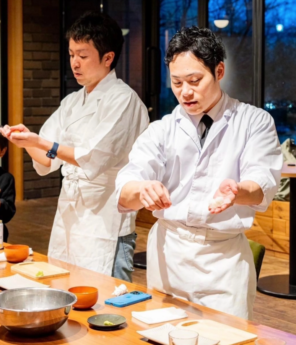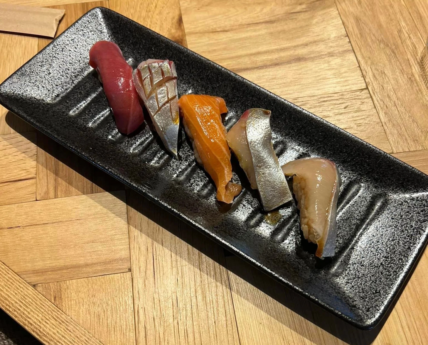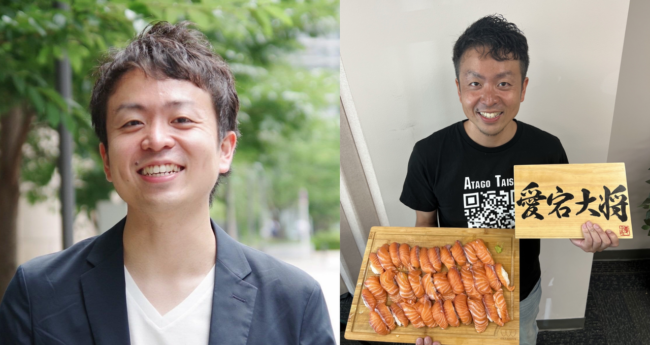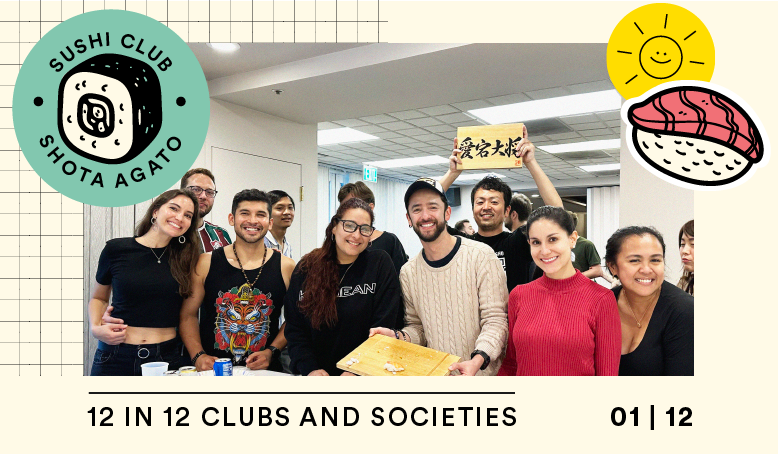Clubs & Societies 12/12 January: “You Can Do it!”—Meet Hult’s Motivational Sushi Master
Shota Agato knows sushi. He has crafted a club with a can-do attitude surrounding the delicacy for the past year—passing on his teaching to his most ambitious and hungriest peers. We sat down with “Taisho” (sushi master) to get a sense of the club and why he feels it’s an important part of the club ecosystem here at Hult.


Hult: What was your first experience of making sushi?
Shota: My area of expertise is originally B2B business, and I founded an HR tech startup in Tokyo about 10 years ago. I first started CODEAL with only 1,000 USD and then sold it to a Japanese-listed company. Before I became a “Sushi Master,” I was a “B2B Business Master” in Asia. After selling the company I returned to Japan to train under Mikoto Kikuchi—still a treasured friend to this day. He was there during the early years and taught me everything I know.
H: Is sushi an art or a science?
Shota: We believe sushi is both an art and a science. Sushi is where we stand at the crossroads of the humanities and the sciences. So, on the one hand, you have the artistic aspect of authentic sushi, such as “Oimakase,” which is supported by the skill of a master sushi chef. Watching them is like watching an artist on a canvas.
On the scientific side, we need to think carefully about how to optimize the delivery route to minimize the pain of the fish used in the sushi. This requires careful consideration and an understanding of the fish you’re preparing, its qualities, acidity, etc. It’s only when you combine creativity with practicality that truly great sushi can be produced.
H: Is wasabi tolerance non-negotiable?


Shota: Some people like wasabi and some people struggle. We offer membership to anyone passionate enough to give![]()
![]() sushi-making a go and don’t discriminate based on spice tolerance. While most sushi-making is more traditional, we pride ourselves in taking inspiration from all corners. Sometimes we have salsa instead of soy and wasabi! We encourage diversity and creativity in every session. We’re always learning.
sushi-making a go and don’t discriminate based on spice tolerance. While most sushi-making is more traditional, we pride ourselves in taking inspiration from all corners. Sometimes we have salsa instead of soy and wasabi! We encourage diversity and creativity in every session. We’re always learning.
H: What are the top skills you develop?
Shota: There are four. The first is an entrepreneurial spirit. Second, although it’s not necessarily a skill, you will make trusted friends. Third, you will learn diversity and how to communicate across cultures. Finally, you will learn how to make sushi! That might be the most important one but I’m happy if you just learn the first three!
H: Does Sushi Club have Hult DNA?
Shota: Sushi Club has Hult DNA. Everything we try and teach is the can-do’ spirit that Hult tries to instill in students.
We started making sushi from scratch—none of our members had any training. Even I, who was born in Japan, hadn’t made Sushi until a year ago. It was really just a hobby at that point and now I am a sushi master. I’m not the most traditional sushi master but I have fun and a can-do attitude. That’s what our members have too.


H: What are your plans for the future?
Shota: Well, I’ll be graduating with my Hult MBA in September. So will a lot of my clubmates. And luckily Sushi Club has become an incredibly diverse club here on the San Francisco campus so there will hopefully be lots of new members even when I’m gone. I’m hoping to pass the baton to a new ‘Taisho.’ Even with little experience, an open mind and open heart is a good start: In the words of Sushi Club’s motto:
‘You can do it!’
Join a cohort of passionate professionals from more than 170 nationalities at Hult International Business School.


